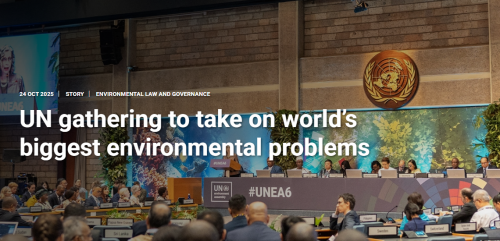The world’s top decision-making body on the environment, the assembly is designed to bring countries together to address the decline of the natural world and to forge a more sustainable future. This year’s gathering is expected to feature discussions on everything from countering wildfires to addressing the environmental impact of artificial intelligence.
But UNEA-7 comes at a challenging time for multilateralism, with geopolitical and economic tensions testing long-standing alliances.
To better understand how that might affect UNEA-7 and why this year’s edition of the assembly is especially important, we spoke with Radhika Ochalik, Director of the Governance Affairs Office at the UN Environment Programme (UNEP). Here are edited excerpts of that conversation.
Maybe we should start with the question on everyone’s mind. How do you think rising international tensions will affect UNEA-7?
Radhika Ochalik (RO): It’s true that these are challenging times for multilateralism. But countries have long shown they can put aside their differences and do what’s best for people and the planet. In fact, that has been a recurring theme since the first UNEA in 2014. Over the last 11 years – despite conflicts, trade tensions and a global pandemic – the assembly has delivered some huge wins for the environment. I expect more of the same this year.
The UNEA-7 theme focuses on sustainability and resilience. Why?
RO: The planet is under mounting pressure. Greenhouse gas emissions are at record highs and global temperatures are spiking. Close to 1 million species are careening towards extinction. Land degradation, deforestation and drought are affecting hundreds of millions. And contaminants, from microplastics to forever chemicals, are streaming into the environment – and into us.
When the planet is under pressure, this puts people under pressure, in terms of rising healthcare costs, lost livelihoods and much more. It is vital we continue to make headway on these problems and to lay the groundwork for a more sustainable future.
At its core UNEA is a decision-making body, with countries coming together to pass resolutions designed to address the three planetary environmental crises of climate change, nature, land and biodiversity loss, and pollution and waste. Past UNEAs have led to some groundbreaking resolutions. Do you expect important decisions this year?
RO: Absolutely. Several countries have submitted draft resolutions. One calls for countries to make artificial intelligence more responsible and sustainable. Another urges a more robust international response to address crimes that affect the environment. A third covers international instruments that could ensure the environmentally sound management of minerals and metals. Other resolutions call for a global scientific assessment of deep-sea ecosystems and the conservation of coral reefs.
These draft resolutions, and others, will be debated at UNEA-7 and it remains to be seen what countries will decide. But the draft resolutions are a clear signal that UNEA is doing what it was designed to do: address emerging environmental issues that require global action.
UNEA resolutions aren’t legally binding. So, why are they important?
RO: The resolutions represent how the countries of the world feel about the most pressing environmental problems and, importantly, how we must tackle them. They help countries forge consensus and build momentum for potentially game-changing agreements. A prime example came from UNEA 5.2 in 2022, when nations agreed to launch formal negotiations on a treaty to end plastic pollution.
How can people take part in or follow UNEA-7?
RO: In-person attendance at UNEA-7 is open to a range of people, including Member States of the UN, intergovernmental organizations, multilateral environmental agreements, non-governmental organizations and the media. Registration is now open. For the general public, all official UNEA meetings will be broadcast in the six official UN languages on the UNEA-7 website, which will be a hub for breaking news. You can also follow the discussion on UNEP’s social media channels, including YouTube, X (formerly Twitter), LinkedIn and Bluesky.
The world is facing a host of problems, from wars to famines to rising living costs. Amid all that, why is a conference about the environment important?
RO: The answer is actually quite simple. The environment is the foundation of our societies and our economies. It provides us with natural resources. It provides us with jobs. It provides us with the air we breathe, the water we drink – and a whole lot of other things.
So, a healthy planet is absolutely crucial to preventing conflicts, ending hunger, reducing inequality and addressing many other global challenges. UNEA is perhaps more important today than ever before.
About the United Nations Environment Assembly
UNEA is the world’s highest-level decision-making body on the environment and includes all 193 Member States of the United Nations. It meets every two years to set the global environmental agenda, provide overarching policy guidance and define policy responses to address emerging environmental challenges. UNEA-7 will take place from 8 to 12 December 2025 at the UN Environment Programme headquarters in Nairobi, Kenya. This year’s session will include, among other things, the approval of UNEP’s Medium-Term Strategy for 2026-2029.













